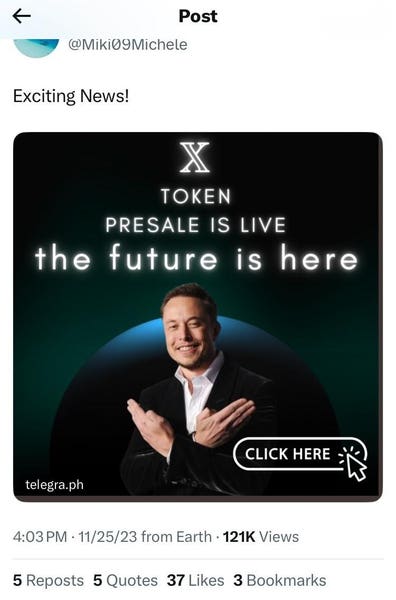For fans of Elon Musk, the perks of investing in X Token seem too good to be true: a trip to Mars in 2025, courtesy of SpaceX; flamethrowers from The Boring Company; brain chips from Neuralink that run OpenAI. The project claims big investors will “play a role in crucial corporate decisions” at Musk’s companies and that the X coin “will be used for payment on [the] X platform.”
Turns out X Token is too good to be true. In August, Musk let it be known twice that he has no plans of developing a cryptocurrency. “To be super clear, none of my companies will ever create a crypto token,” he said again in November.
But Musk’s lack of involvement in X Token doesn’t mean he isn’t benefiting from it. That’s because the scam’s promoters have been buying ads on X for nearly three months since launching in September. They have also been paying X for an untold number of verified accounts to serve as foot soldiers in their ad campaign, likely costing thousands of dollars. (X could not be reached for comment; an auto-response to Forbes’ email said, “Busy now, please check back later.”)
X Token ads direct users to a professional-looking website featuring glamorous logos of Musk’s companies. There, X Token claims to have already sold about 4 million X coins for $3.95 each – a $15 million haul, if true – out of some 6,475,000 coins. Prospective buyers are given clear instructions: Input their emails, phone numbers, and passwords to create an “X Token account.” From there, X Token explains, step by step, how to download the Coinbase app, buy cryptocurrency, and send the cryptocurrency to a unique wallet address generated by X Token. (Requests for comment sent to X Token’s chatbot went unreturned).
The people behind X Token don’t want to be found. X Token’s most recent website domain name was registered on Nov. 17 by a company called WhoisProtection, headquartered in Kuala Lumpur, Malaysia. WhoisProtection says on its website that it “merely helps to shield the domain registrant[’s] actual information,” providing an alternate set of information and has no ownership over the domain names.” An analysis of the website’s domain shows links to other dubious URLs involving crypto, including a SpaceX-themed environment and one involving “CZ,” the nickname used by Changpeng Zhao, the founder of crypto exchange Binance (and identity frequently assumed by hackers). X Token’s site also has ties to an online marketplace for forged passports, utility bills, and other documents used in identity thefts.
To evade notice, X Token has deployed verified X accounts. These handles, which have small numbers of followers, run X Token ads for a short period before they delete them, leaving no trace on each account’s timeline–making it difficult to measure the campaign’s total reach. Forbes identified eighteen different X accounts that had posted X Token ads between the beginning of September and November 25. Several ads had received over 100,000 impressions when other X users screenshotted them.
Some of X Token’s accounts still have undeleted tweets from their former owners, giving them the appearance of legitimate ownership. Forbes traced one of these proxy accounts to a German-speaking man named Martin M, who had previously tweeted out links to his downhill longboarding group. Martin contacted Facebook Messenger and said he hadn’t tweeted since April 2022. Martin says he had not realized his X account had been taken over, much less it was being used to promote X Token. “I only noticed it now through you,” he says.
After running X Token ads, some accounts cease to be verified: Of the 18 identified by Forbes, 10 still need to be confirmed, while seven still are. One version was deleted.
Users of X have been trying to alert corporate X to the scam for weeks. “Twitter Blue continues to be instrumentalized by hackers,” said Thomas Fischer on Oct. 15 in a thread about X Token, whose first tweet tagged X’s safety team. “The ad is gone, but the user is still on here and still verified!” tweeted a woman named Heather on Oct. 18 in a thread on X token that tagged X’s CEO, Linda Yaccarino. “That says everything. They only care about money.” Even Geoff McGivern, the 71-year-old British actor known for playing Ford Prefect in The Hitchhiker’s Guide to the Galaxy, called out X Token, alleging that X is aware of the scam but is doing nothing to stop it. (Forbes could not independently verify that claim; a rep for McGivern declined to comment.)
X Token is the latest in an ever-growing list of Elon impersonators and cryptocurrency scammers on X under Musk’s ownership. SpaceX coin, a similar scam offering a “presale” to investors, was advertising on X over the summer before it disappeared. Before that, Tesla Token was running rampant. According to consumer complaints obtained through FOIA requests, the advance of deep fake videos depicting Musk endorsing fake investment schemes has tricked countless people.
As the X Token scam proliferates, large corporate advertisers have been freezing ad spending at X under its new owner, not because of the fraud but because of other reasons. Revenues were down 59 percent from a year earlier in April and May, the New York Times reported, and following Musk’s endorsement of an anti-Semitic conspiracy theory earlier this month, ad buyers from Airbnb to Amazon have halted or canceled their plans to buy X ads.
No wonder X is giving ad buyers a discount. Under a new initiative, verified X users – those paying X at least $8 per month, or $84 annually, for its premium membership – will get an extra $1,000 worth of ad buys for every $1,000 spent. “Good value for money,” Musk tweeted about the sale to his over 164 million followers on Nov. 24.

